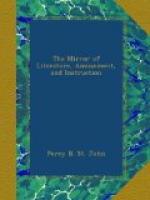* * * * *
In 1306, Bruce having taken shelter in the Isle of Arran, sent a trusty person into Carrick, to learn how his vassals stood affected to his cause; with instructions, that, if he found them disposed to assist him he should make a signal at a time appointed, by lighting a fire on an eminence near the Castle of Turnbury. The messenger found the English in possession of Carrick, the people dispirited, and none ready to take arms; he therefore did not make the signal. But a fire being made about noon on the appointed spot, (possibly by accident) both Bruce and the messenger saw it. The former with his associates put to sea to join his supposed party; the latter to prevent his coming. They met before Bruce reached the shore, when the messenger acquainted Bruce with the unpromising state of his affairs, and advised him to go back; but he obeying the dictates of despair and valour, resolved to persevere; and attacking the English, carelessly cantoned in the neighbourhood of Turnbury, put a number of them to the sword, and pillaged their quarters. Percy, from the castle, heard the uproar, yet did not sally forth against them, not knowing their strength. Bruce with his followers not exceeding three hundred in number, remained for some days near Turnbury; but succours having arrived from the neighbouring garrisons, he was obliged to seek safety in the mountainous parts of Carrick.
C.D.
* * * * *
“WILLIE WASTLE.”
When Oliver Cromwell was at Haddington, he sent a summons to the governor of Hume Castle, ordering him to surrender. The governor answered,
“That he, Willie Wastle, stood firm
in his castle,
That all the dogs of his town should not
drive Willie Wastle down.”
This anecdote gave rise to the amusement of Willie Wastle among children.
* * * * *
When the Irish Union was effected in 1801, the Ex-Chancellor of the Exchequer, Sir John Parnell, was the reigning toast. Being one evening in a convivial party, he jocularly said that by the Union he had lost his bread and butter. “Ah, my dear sir,” replied a friend, “never mind, for it is amply made up to you in toasts.”
* * * * *
CURIOUS LEGACY.
By Samuel Hawkins, Esq. to White Chapel Parish, 1804, bequeathing L300. for performing Divine Service for ever, in the said parish church.
Two guineas to be paid to Curate or Rector, for preaching a sermon on New Year’s Day, from a text mentioned in his will. To Parish Clerk 10s. 6d. to sing 100th Psalm, old version, same day. To organist 10s. 6d. for playing tune to same. To Sexton 10s. 6d. if he attend the same; and to master and mistress of the free-school, each 10s. 6d. for attending the charity children at the same time and place; and to the Trustees of the school three guineas for refreshments, and to supply as many quartern loaves to be distributed to such poor as shall attend divine service on that day. The overplus, if any, to be given in bread to the poor of the parish that the trustees may consider proper objects of relief.




